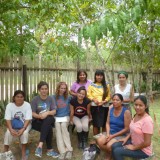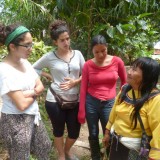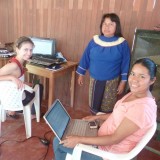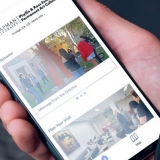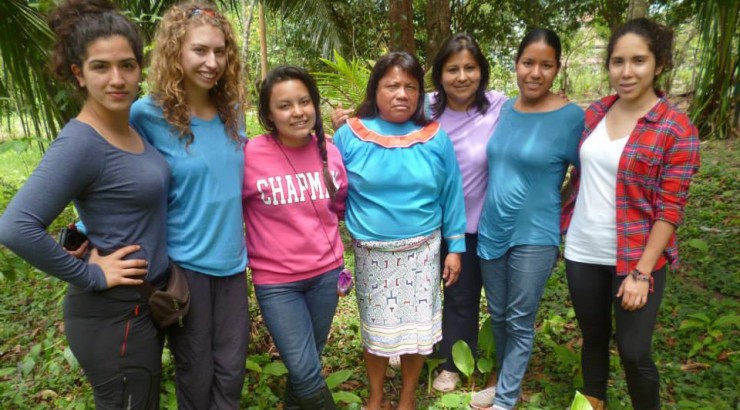
Wilkinson Students translate book by Shipibo woman into English in the Peruvian Amazon
February 3, 2014
Over the 2014 January Interterm, Associate Professor Pilar Valenzuela (Department of World Languages & Cultures) led a group of Chapman students as part of a research initiative. The group of four (Stephanie Estrada, Spanish Major (’15), Rebeca Herrera, Political Science, Peace Studies, Women’s Studies (’14), Valeria Sosa, Political Science Major, Spanish Minor (’14) and Emily Frisch, Biology Major and Spanish Minor (’16)) spent three weeks in the Peruvian Amazon learning about the Shipibo culture.
The students did two types of work, they read the book “KOSHI SHINANYA AINBO: El Testimonio de una Mujer Shipiba” (the first book telling the testimony of an Indigenous Amazonian woman), published in Shipibo and Spanish and translated the book from Spanish to English to learn about the Shipibo people and promote their culture by making the book available to a wider audience.
The students met the book protagonist and co-author, Mrs. Agustina Valera Rojas, a pottery artist from San Francisco de Yarinacocha, a Shipibo village in the heart of the Peruvian Amazon, and thanks to their work, the book will now be available in Shipibo, Spanish, and English.
In the book Rojas shares her life stories, her people’s traditional knowledge and values, her views on inter-ethnic relations, globalization, the future of the Shipibo people and their culture. It has received positive reviews from anthropologists devoted to the study of Indigenous Amazonian cultures, and has been specially well-received by the Shipibo people.
“In doing this work, we were helped by two Shipibo bilingual teachers who met with us every night in order to clarify terminology and explain concepts from the Shipibo traditional culture to ensure a good translation,” said Professor Valenzuela. “We also visited the book protagonist in her house, in the Shipibo village called San Francisco de Yarinacocha,” she said.
Now that the translation has been done, they will continue to edit their work here at Chapman University this semester.
“This was a great way to complete a specific task while at the same time exploring the Shipibo culture,” said Professor Valenzuela.
In addition to translating the book, each student investigated a specific topic of the Shipibo culture: shamanism and medicine (Frisch), girls’ puberty rites (Herrera), prescriptions followed by the parents of a newborn baby (Estrada), and the social impact of manufacturing handicrafts for the market (Valeria Sosa).
The Shipibo are an Indigenous group of the Peruvian Amazon composed of approximately 35,000 people. They live in separate villages along the Ucayali River and its main tributaries. There is also a significant Shipibo population living in the town of Yarinacocha.
